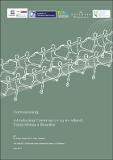| dc.contributor.author | Shaw, Aileen | |
| dc.contributor.author | Canavan, John | |
| dc.date.accessioned | 2017-11-08T11:26:35Z | |
| dc.date.available | 2017-11-08T11:26:35Z | |
| dc.date.issued | 2017-05 | |
| dc.identifier.citation | Shaw. A, Canavan, J. (2017) Introducing Commissioning in Ireland: Establishing a Baseline. Galway: The UNESCO Child and Family Research Centre, National University of Ireland, Galway. | en_IE |
| dc.identifier.isbn | 978-9-905861-38-5 | |
| dc.identifier.uri | http://hdl.handle.net/10379/6958 | |
| dc.description.abstract | Established on 1 January 2014, through the Child and Family Agency Act, Tusla is responsible for
improving well-being and outcomes for children.1
In 2014, Tusla published the first nationally developed
commissioning strategy for child and family services in the Republic of Ireland. The strategy defines
commissioning as ‘the process of deciding how to use the total resources available for children and
families in order to improve outcomes in the most efficient, equitable, proportionate and sustainable
way’ (Gillen et al., 2013: 1). Based on the approach outlined in the strategy, Tusla undertook to develop
a three-year commissioning plan (2015–18).
Among the functions set out for Tusla in legislation, the Act also creates a new framework for
accountability for the use of resources; for financial arrangements between the agency and other
organisations, including not-for-profit providers; and for non-financial service provision arrangements
with other statutory bodies. This drive for an effective resource-allocation orientation takes place in
the context of a national policy orientation towards greater management of constrained resources. In
the area of children and family services, the Department of Children and Youth Affairs’ Statement of
Strategy 2011–2014, acknowledging severe resource constraints, specifies the need for research evidence
on effectiveness to inform the review, redesign or curtailment of such programmes and services (DCYA,
2012). The first overarching national policy framework for children and young people in Ireland, Better
Outcomes, Brighter Futures, stipulates that Tusla must introduce the commissioning of services ‘by
moving away from a grants system to outcome-based contracts, and offer support to build capacity
within the children and youth sector to respond to the new approach’ (DCYA, 2014: 69). Outside of the
children and youth sector, a key theme of the Department of Public Expenditure and Reform’s strategy
is the need for a stronger emphasis on better outcomes for service users, and a commitment to change
how services are designed and delivered (DPER, 2014). | en_IE |
| dc.format | application/pdf | en_IE |
| dc.language.iso | en | en_IE |
| dc.publisher | UNESCO Child and Family Research Centre, National University of Ireland Galway | en_IE |
| dc.rights | Attribution-NonCommercial-NoDerivs 3.0 Ireland | |
| dc.rights.uri | https://creativecommons.org/licenses/by-nc-nd/3.0/ie/ | |
| dc.subject | Commissioning | en_IE |
| dc.subject | Ireland | en_IE |
| dc.title | Introducing commissioning in Ireland: establishing a baseline | en_IE |
| dc.type | Report | en_IE |
| dc.date.updated | 2017-11-07T16:37:33Z | |
| dc.local.publishedsource | http://www.childandfamilyresearch.ie/media/unescochildandfamilyresearchcentre/dmpfilesmaster/2017_Introducing-Commissioning-in-Ireland.-Establishing-a-Baseline-final_digital.pdf | en_IE |
| dc.description.peer-reviewed | peer-reviewed | |
| dc.contributor.funder | |~| | |
| dc.internal.rssid | 13414229 | |
| dc.local.contact | Aileen Shaw, Child & Family Research Centre, Dept. Of Political Science & Soc, Nui, Galway. 3879 Email: aileen.shaw@nuigalway.ie | |
| dc.local.copyrightchecked | Yes | |
| dc.local.version | PUBLISHED | |
| nui.item.downloads | 193 | |


